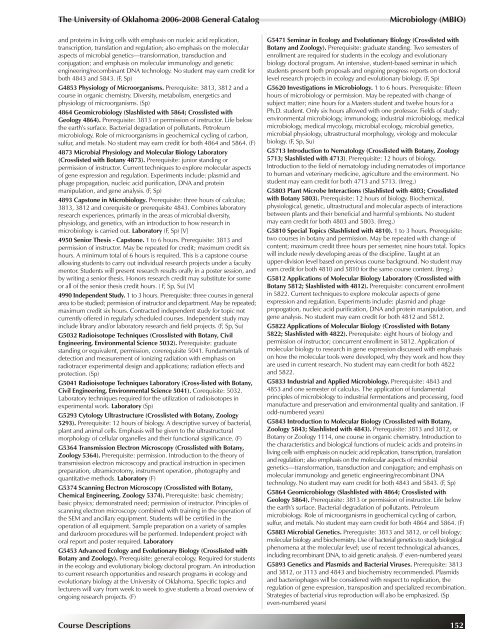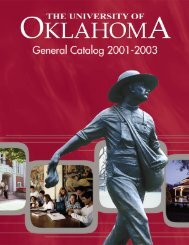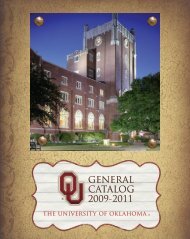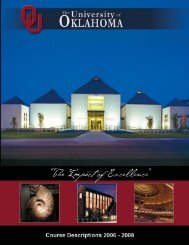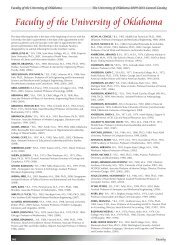2006-08 Course Descriptions - Catalog - University of Oklahoma
2006-08 Course Descriptions - Catalog - University of Oklahoma
2006-08 Course Descriptions - Catalog - University of Oklahoma
You also want an ePaper? Increase the reach of your titles
YUMPU automatically turns print PDFs into web optimized ePapers that Google loves.
The Uni ver sity <strong>of</strong> <strong>Oklahoma</strong> <strong>2006</strong>-20<strong>08</strong> Gen eral Cat a logMicrobiology (MBIO)and proteins in living cells with emphasis on nucleic acid replication,transcription, translation and regulation; also emphasis on the molecularaspects <strong>of</strong> microbial genetics—transformation, transduction andconjugation; and emphasis on molecular immunology and geneticengineering/recombinant DNA technology. No student may earn credit forboth 4843 and 5843. (F, Sp)G4853 Physiology <strong>of</strong> Microorganisms. Prerequisite: 3813, 3812 and acourse in organic chemistry. Diversity, metabolism, energetics andphysiology <strong>of</strong> microorganisms. (Sp)4864 Geomicrobiology (Slashlisted with 5864; Crosslisted withGeology 4864). Prerequisite: 3813 or permission <strong>of</strong> instructor. Life belowthe earth’s surface. Bacterial degradation <strong>of</strong> pollutants. Petroleummicrobiology. Role <strong>of</strong> microorganisms in geochemical cycling <strong>of</strong> carbon,sulfur, and metals. No student may earn credit for both 4864 and 5864. (F)4873 Microbial Physiology and Molecular Biology Laboratory(Crosslisted with Botany 4873). Prerequisite: junior standing orpermission <strong>of</strong> instructor. Current techniques to explore molecular aspects<strong>of</strong> gene expression and regulation. Experiments include: plasmid andphage propagation, nucleic acid purification, DNA and proteinmanipulation, and gene analysis. (F, Sp)4893 Capstone in Microbiology. Prerequisite: three hours <strong>of</strong> calculus;3813, 3812 and corequisite or prerequisite 4843. Combines laboratoryresearch experiences, primarily in the areas <strong>of</strong> microbial diversity,physiology, and genetics, with an introduction to how research inmicrobiology is carried out. Laboratory (F, Sp) [V]4950 Senior Thesis - Capstone. 1 to 6 hours. Prerequisite: 3813 andpermission <strong>of</strong> instructor. May be repeated for credit; maximum credit sixhours. A minimum total <strong>of</strong> 6 hours is required. This is a capstone courseallowing students to carry out individual research projects under a facultymentor. Students will present research results orally in a poster session, andby writing a senior thesis. Honors research credit may substitute for someor all <strong>of</strong> the senior thesis credit hours. ( F, Sp, Su) [V]4990 Independent Study. 1 to 3 hours. Prerequisite: three courses in generalarea to be studied; permission <strong>of</strong> instructor and department. May be repeated;maximum credit six hours. Contracted independent study for topic notcurrently <strong>of</strong>fered in regularly scheduled courses. Independent study mayinclude library and/or laboratory research and field projects. (F, Sp, Su)G5032 Radioisotope Techniques (Crosslisted with Botany, CivilEngineering, Environmental Science 5032). Prerequisite: graduatestanding or equivalent, permission, corerequisite 5041. Fundamentals <strong>of</strong>detection and measurement <strong>of</strong> ionizing radiation with emphasis onradiotracer experimental design and applications; radiation effects andprotection. (Sp)G5041 Radioisotope Techniques Laboratory (Cross-listed with Botany,Civil Engineering, Environmental Science 5041). Corequisite: 5032.Laboratory techniques required for the utilization <strong>of</strong> radioisotopes inexperimental work. Laboratory (Sp)G5293 Cytology Ultrastructure (Crosslisted with Botany, Zoology5293). Prerequisite: 12 hours <strong>of</strong> biology. A descriptive survey <strong>of</strong> bacterial,plant and animal cells. Emphasis will be given to the ultrastructuralmorphology <strong>of</strong> cellular organelles and their functional significance. (F)G5364 Transmission Electron Microscopy (Crosslisted with Botany,Zoology 5364). Prerequisite: permission. Introduction to the theory <strong>of</strong>transmission electron microscopy and practical instruction in specimenpreparation, ultramicrotomy, instrument operation, photography andquantitative methods. Laboratory (F)G5374 Scanning Electron Microscopy (Crosslisted with Botany,Chemical Engineering, Zoology 5374). Prerequisite: basic chemistry;basic physics; demonstrated need; permission <strong>of</strong> instructor. Principles <strong>of</strong>scanning electron microscopy combined with training in the operation <strong>of</strong>the SEM and ancillary equipment. Students will be certified in theoperation <strong>of</strong> all equipment. Sample preparation on a variety <strong>of</strong> samplesand darkroom procedures will be performed. Independent project withoral report and poster required. LaboratoryG5453 Advanced Ecology and Evolutionary Biology (Crosslisted withBotany and Zoology). Prerequisite: general ecology. Required for studentsin the ecology and evolutionary biology doctoral program. An introductionto current research opportunities and research programs in ecology andevolutionary biology at the <strong>University</strong> <strong>of</strong> <strong>Oklahoma</strong>. Specific topics andlecturers will vary from week to week to give students a broad overview <strong>of</strong>ongoing research projects. (F)G5471 Seminar in Ecology and Evolutionary Biology (Crosslisted withBotany and Zoology). Prerequisite: graduate standing. Two semesters <strong>of</strong>enrollment are required for students in the ecology and evolutionarybiology doctoral program. An intensive, student-based seminar in whichstudents present both proposals and ongoing progress reports on doctorallevel research projects in ecology and evolutionary biology. (F, Sp)G5620 Investigations in Microbiology. 1 to 6 hours. Prerequisite: fifteenhours <strong>of</strong> microbiology or permission. May be repeated with change <strong>of</strong>subject matter; nine hours for a Masters student and twelve hours for aPh.D. student. Only six hours allowed with one pr<strong>of</strong>essor. Fields <strong>of</strong> study:environmental microbiology, immunology, industrial microbiology, medicalmicrobiology, medical mycology, microbial ecology, microbial genetics,microbial physiology, ultrastructural morphology, virology and molecularbiology. (F, Sp, Su)G5713 Introduction to Nematology (Crosslisted with Botany, Zoology5713; Slashlisted with 4713). Prerequisite: 12 hours <strong>of</strong> biology.Introduction to the field <strong>of</strong> nematology including nematodes <strong>of</strong> importanceto human and veterinary medicine, agriculture and the environment. Nostudent may earn credit for both 4713 and 5713. (Irreg.)G5803 Plant Microbe Interactions (Slashlisted with 4803; Crosslistedwith Botany 5803). Prerequisite: 12 hours <strong>of</strong> biology. Biochemical,physiological, genetic, ultrastructural and molecular aspects <strong>of</strong> interactionsbetween plants and their beneficial and harmful symbionts. No studentmay earn credit for both 4803 and 5803. (Irreg.)G5810 Special Topics (Slashlisted with 4810). 1 to 3 hours. Prerequisite:two courses in botany and permission. May be repeated with change <strong>of</strong>content; maximum credit three hours per semester, nine hours total. Topicswill include newly developing areas <strong>of</strong> the discipline. Taught at anupper-division level based on previous course background. No student mayearn credit for both 4810 and 5810 for the same course content. (Irreg.)G5812 Applications <strong>of</strong> Molecular Biology Laboratory (Crosslisted withBotany 5812; Slashlisted with 4812). Prerequisite: concurrent enrollmentin 5822. Current techniques to explore molecular aspects <strong>of</strong> geneexpression and regulation. Experiments include: plasmid and phagepropogation, nucleic acid purification, DNA and protein manipulation, andgene analysis. No student may earn credit for both 4812 and 5812.G5822 Applications <strong>of</strong> Molecular Biology (Crosslisted with Botany5822; Slashlisted with 4822). Prerequisite: eight hours <strong>of</strong> biology andpermission <strong>of</strong> instructor; concurrent enrollment in 5812. Application <strong>of</strong>molecular biology to research in gene expression discussed with emphasison how the molecular tools were developed, why they work and how theyare used in current research. No student may earn credit for both 4822and 5822.G5833 Industrial and Applied Microbiology. Prerequisite: 4843 and4853 and one semester <strong>of</strong> calculus. The application <strong>of</strong> fundamentalprinciples <strong>of</strong> microbiology to industrial fermentations and processing, foodmanufacture and preservation and environmental quality and sanitation. (Fodd-numbered years)G5843 Introduction to Molecular Biology (Crosslisted with Botany,Zoology 5843; Slashlisted with 4843). Prerequisite: 3813 and 3812, orBotany or Zoology 1114, one course in organic chemistry. Introduction tothe characteristics and biological functions <strong>of</strong> nucleic acids and proteins inliving cells with emphasis on nucleic acid replication, transcription, translationand regulation; also emphasis on the molecular aspects <strong>of</strong> microbialgenetics—transformation, transduction and conjugation; and emphasis onmolecular immunology and genetic engineering/recombinant DNAtechnology. No student may earn credit for both 4843 and 5843. (F, Sp)G5864 Geomicrobiology (Slashlisted with 4864; Crosslisted withGeology 5864). Prerequisite: 3813 or permission <strong>of</strong> instructor. Life belowthe earth’s surface. Bacterial degradation <strong>of</strong> pollutants. Petroleummicrobiology. Role <strong>of</strong> microorganisms in geochemical cycling <strong>of</strong> carbon,sulfur, and metals. No student may earn credit for both 4864 and 5864. (F)G5883 Microbial Genetics. Prerequisite: 3813 and 3812, or cell biology;molecular biology and biochemistry. Use <strong>of</strong> bacterial genetics to study biologicalphenomena at the molecular level; use <strong>of</strong> recent technological advances,including recombinant DNA, to aid genetic analysis. (F even-numbered years)G5893 Genetics and Plasmids and Bacterial Viruses. Prerequisite: 3813and 3812, or 3113 and 4843 and biochemistry recommended. Plasmidsand bacteriophages will be considered with respect to replication, theregulation <strong>of</strong> gene expression, transposition and specialized recombination.Strategies <strong>of</strong> bacterial virus reproduction will also be emphasized. (Speven-numbered years)<strong>Course</strong> <strong>Descriptions</strong> 152


